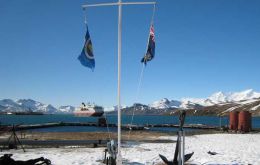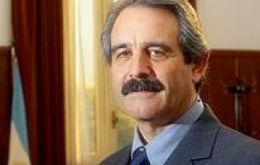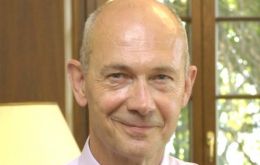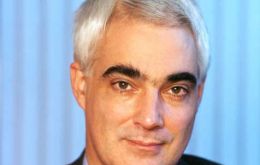MercoPress. South Atlantic News Agency
Stories for 2008
-
Wednesday, July 16th 2008 - 21:00 UTC
Argentina faces complicated horizon, says Wall Street

Wall Street analysts forecast a complicated horizon for Argentina fueled by the government's political problems, slower economy, rising inflation and the ongoing dispute with farmers over taxes which some anticipate will find its way to the courts, according to reports in the Buenos Aires press.
-
Wednesday, July 16th 2008 - 21:00 UTC
Tighter restrictions for site access in South Georgia

Under the revised Tourism Management Policy document from the government of South Georgia, in the South Atlantic, tighter restrictions have been placed on site access for private vessels with more than 10 persons on board (including paid crew).
-
Wednesday, July 16th 2008 - 21:00 UTC
Ecuador, Venezuela agree to build biggest oil refinery

Rafael Correa, the Ecuadorian president, and Hugo Chavez, his Venezuelan counterpart, have entered into an agreement to build the biggest oil refinery on South America's Pacific coast.
-
Tuesday, July 15th 2008 - 21:00 UTC
Kirchners Senate block show cracks ahead of crucial vote
With less than two days for the crucial Congressional vote on the sliding tax regime on grain and oil seed exports which is at the heart of a dispute between the Argentine administration of Cristina Fernandez de Kirchner and the farmers, the final tally remains uncertain.
-
Tuesday, July 15th 2008 - 21:00 UTC
Argentina re-implants export benefits to help fishing industry

Argentina re-established benefits to fisheries exports to the tune of 20 million US dollars annually according to reports in the Buenos Aires press. Benefits range from 1% to 10% depending on the added value to the exported product.
-
Tuesday, July 15th 2008 - 21:00 UTC
SS doctor Aribert Heim 'still alive in Chile'

Former SS doctor Aribert Heim is still likely to be alive in Chile, said a director of the Simon Wiesenthal Centre at the end of a five-day mission.
-
Tuesday, July 15th 2008 - 21:00 UTC
Petrobras record production; strike coming to an end

Brazil's oil and gas government managed corporation Petrobras announced on Tuesday that total production (domestic and abroad) in June reached a record of 2.412.155 barrels of oil equivalent per day, boed, which is 3.3% higher than a year ago and 2.3% over May 2008.
-
Tuesday, July 15th 2008 - 21:00 UTC
Increased chances for global trade accord, says WTO Lamy

World Trade Organization Director-General Pascal Lamy said the chances of success for reaching a world-trade agreement have increased as a result of talks before trade ministers meet next week in Geneva.
-
Tuesday, July 15th 2008 - 21:00 UTC
UK June inflation soars to an 11 year high of 3.8%

Rising food and fuel costs pushed UK inflation up to an 11-year high of 3.8% in June from 3.3% in May, figures show. The rise means inflation is now well above the government's 2% target, and may reduce the chance of a UK rate cut.
-
Tuesday, July 15th 2008 - 21:00 UTC
Mercosur unsatisfied with WTO agenda for next meeting

Brazil's Foreign Affairs Minister Celso Amorim said that developed nations' agricultural subsidies and tariff barriers for farm goods remain the biggest obstacle to an agreement on the long-stalled Doha round of World Trade Organization talks.
